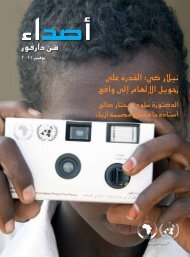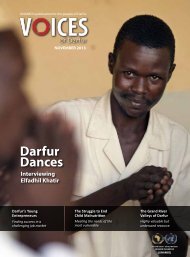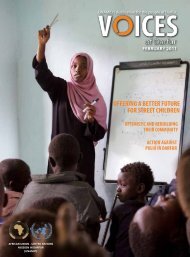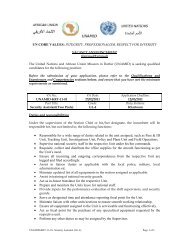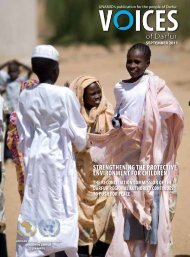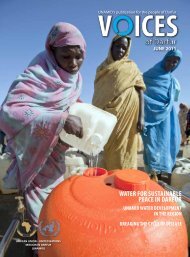THE POWER OF KNOWLEDGE
the power of knowledge - African Union - United Nations Mission in ...
the power of knowledge - African Union - United Nations Mission in ...
- No tags were found...
You also want an ePaper? Increase the reach of your titles
YUMPU automatically turns print PDFs into web optimized ePapers that Google loves.
CULTURE<br />
Omar Ihsas at one of his concert.<br />
PHOTO COURTESY <strong>OF</strong>: OMAR IHSAS<br />
Artist brings his message home<br />
An interview with Omar Ihsas<br />
BY Ala mayyahi<br />
While renowned musician Omar Ihsas has<br />
enjoyed international success, bringing<br />
Sudanese music to thousands of admirers<br />
in the United Kingdom, the United States<br />
and Canada, it is his love for Darfur that<br />
matters most to him.<br />
Begining his career in his late teens,<br />
Omar Ihsas would leave his hometown<br />
of Nyala, South Darfur, at the age of 23<br />
for Khartoum. It was there that his talent<br />
would be realized after auditioning for the<br />
Institute of Music and Drama in 1981.<br />
Tell us about your musical career. Did<br />
you obtain success immediately?<br />
Success did not come easy at all, especially<br />
given the goals I set for myself. I have had<br />
four difficult starting points. The first was<br />
in Darfur, the second in Khartoum, the<br />
third when I began using Darfuri rhythms,<br />
which were resisted by some media<br />
institutions, and the final when I started<br />
performing abroad. Still, there remain<br />
obstacles, but they are minor since I am<br />
always supported by my audience, with<br />
whom I share my love and appreciation.<br />
Is Sudanese music influenced by<br />
African or Arabic rhythms, and where<br />
does Darfuri music stand in this matter?<br />
Both rhythms exist in the Sudanese<br />
identity. We are all affected by the Arabic<br />
tones in some parts of Sudan, but all<br />
our rhythms are African. In Darfur, the<br />
Sudanese identity is felt strongly. In the<br />
Baggara area, there are tribes that still use<br />
some of the old Arabic music (Maqamat)<br />
associated with typical African beats. So<br />
the African beat is a common element in<br />
our music as Sudan is an African Arabic<br />
country with African music character. I<br />
personally show this in my music.<br />
What projects are you currently<br />
working on?<br />
I am arranging a large singing project.<br />
It’s an operetta about Sultan Ali Dinar,<br />
accompanied by a number of Sudanese<br />
singers, and written by the poet Mahjoub<br />
Julgam, who is from El Fasher. There is also<br />
preparation for a peace song to children<br />
of Darfur in cooperation with UNAMID,<br />
in which I will do the music composition<br />
and art direction. In addition, I’m doing<br />
the final touches for a music video, called<br />
Azoom, written by Darfuri poet Alim<br />
Abbas Mohammed Noor, he is from El<br />
Fasher too. The Word Azoom is the name<br />
of the biggest valley in Darfur, and the<br />
poem won the grand prize in a 1973<br />
poetry contest.<br />
8 VOICES <strong>OF</strong> DARFUR, JANUARY 2011



